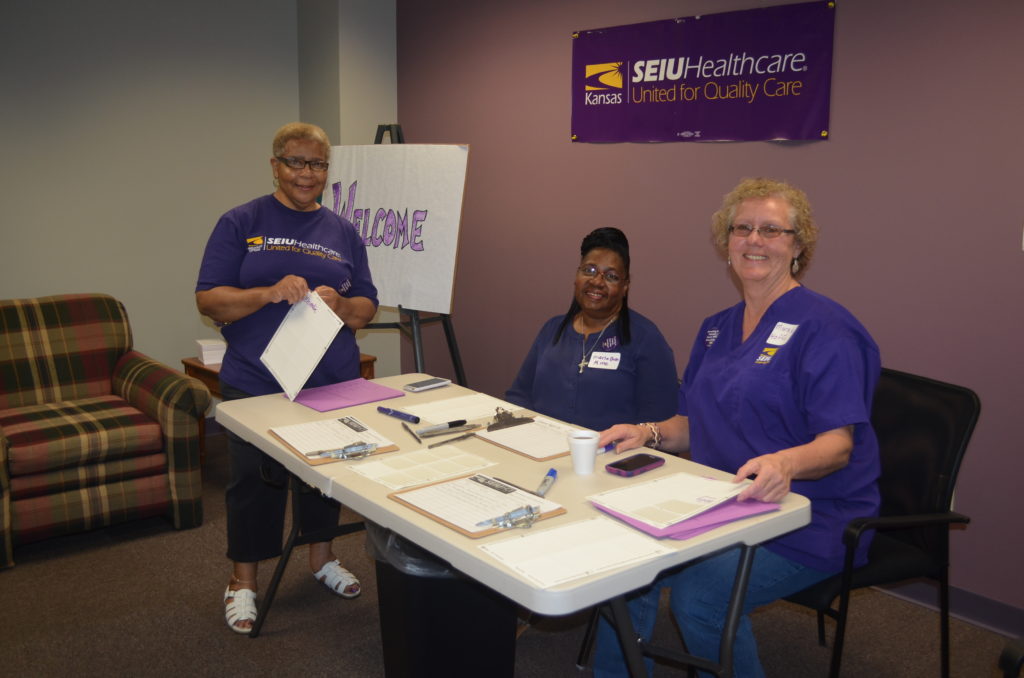Research & Menorah Medical Center Workers Ramp Up Efforts as They Battle for a Fair Contract

Employees at Hospital Corporation of America (HCA) Affiliated, Research & Menorah Medical Centers in Kansas City & Overland Park Join Fight for Better Wages, Better Jobs
 On Saturday, July 19, Research and Menorah employees gathered to talk with elected officials and community leaders about why good paying jobs matter in the field of healthcare. Support from electeds and the community was overwhelming in the standing room only event. Workers shared stories wit the crowd and then on video in a “Story Booth”, so their message can be memorialized and used to educate and involve others in their fight for better jobs and quality care.
On Saturday, July 19, Research and Menorah employees gathered to talk with elected officials and community leaders about why good paying jobs matter in the field of healthcare. Support from electeds and the community was overwhelming in the standing room only event. Workers shared stories wit the crowd and then on video in a “Story Booth”, so their message can be memorialized and used to educate and involve others in their fight for better jobs and quality care.
Research Medical Center had a net income of $4.7 million dollars in 2012, an 18% increase in revenue in 5 years1, and Menorah Medical Center had a net income of $19.99 million, (representing an astounding 10% profit margin) in 20131. Despite the healthy financial situation, many employees struggle to survive on less than $10 an hour. Higher paid certified and registered professional employees leave Research and Menorah for more lucrative paying jobs in their fields at other area hospitals. This has resulted in an average turnover rate of 45%2 since 2011.
“At the end of the day, if hospitals don’t pay wages that provide employees some stability, and recognize education and skill, employees leave. There needs to be continuity of care and a stable work force if we are going to provide the highest quality of care that our patients deserve,” says Renita Pierro an OR Tech at Menorah Medical Center, and married mother of young children who struggles to afford the health insurance offered at the hospital on her rate of pay.
Beside low hourly wages and non competitive salaries, employees complain about the cost of health insurance through the hospitals. Janet Highfill, a Respiratory Therapist at Menorah Medical Center says, “Last year when I did my taxes, I calculated that I paid over $8,000 in premiums and co pays, and I’m a healthy person. That directly impacts my take home pay, and causes many of my coworkers to look for employment elsewhere, leaving us feeling like we are always scrambling to keep staff. If staffing levels drop, it is more likely that patients will wait, and that is not what our healthcare system should be about.”
Corita Brown, who prepares food in the dietary department at Research Medical Center, is thankful she doesn’t have to provide healthcare for her family on her salary. Corita says, “In thirty-five years with the hospital, I am making about the same wage rate as newer employees, and I’ve seen everything go up including the cost of healthcare premiums and gas to get to work, but not my wages. Research has started hiring employees who are categorized as ‘per diem’, or ‘as-needed’, and employees are frequently sent home early to meet cost and productivity quotas, leaving workers short on pay day. This concerns me when I see so many people who need and are willing to work full time jobs.”
“We came into these jobs because we care about people, and we care about our communities’ health. I want to stay at Research, but ultimately I have to figure out what’s best for my family. Paying child care, and what I consider extremely expensive healthcare premiums when I work at a hospital, makes it very difficult to keep turning down better pay at other hospitals. It’s a hard choice, when you care about your patients and want to continue doing what you love,” states Jessica Locker, Nuclear Med Tech at Research.
This week workers are meeting to conduct a strike vote – a method of last resort that many feel is the only option left to get across the importance of retention of skilled, experienced employees for high quality patient care.
